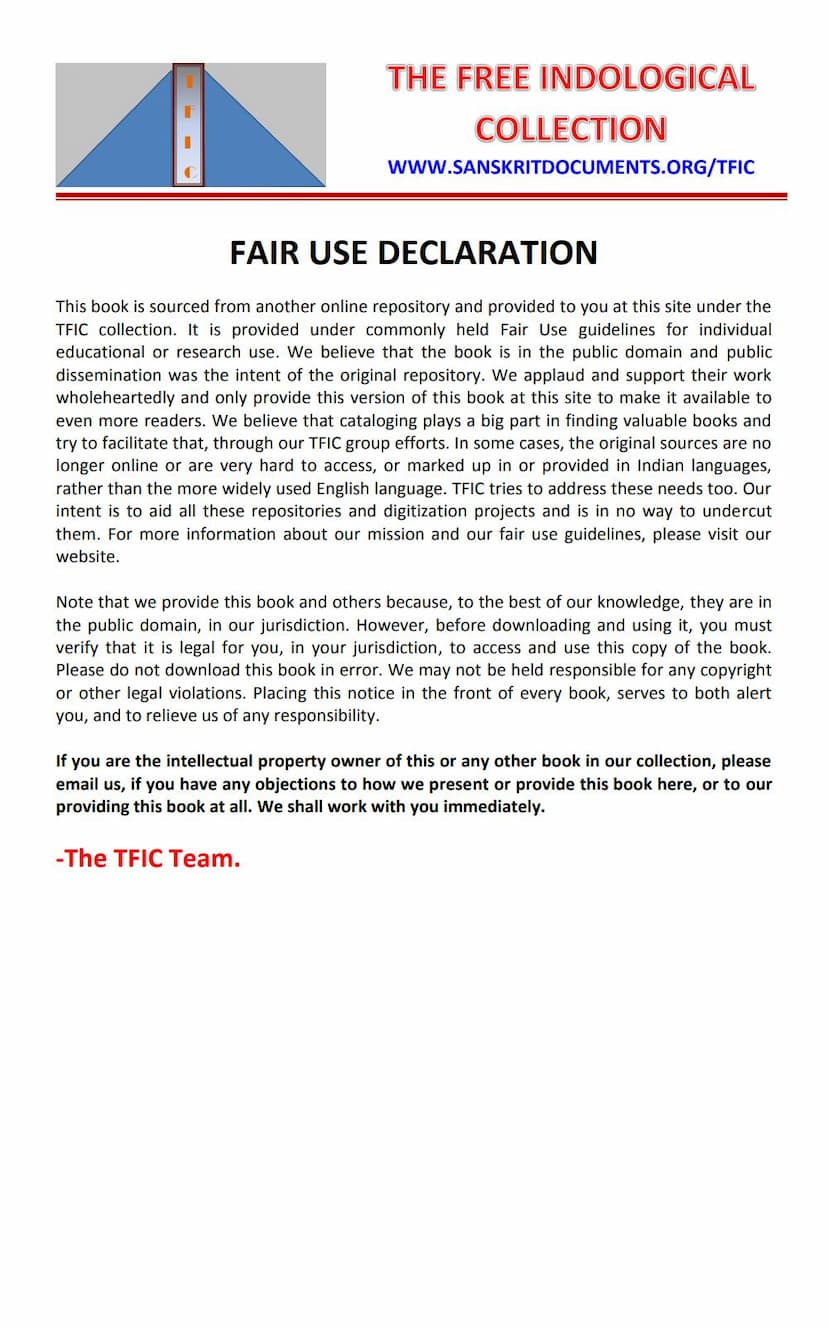Jain Swadhyaya Mala
Added to library: September 2, 2025

Summary
The provided text is a Jain religious text titled "Jain Swadhyaya Mala" (जैन स्वाध्यायमाला), published by Akhil Bharatiya Sadhumargi Jain Sanskruti Rakshak Sangh in Sailana, Madhya Pradesh, India. The catalog link provided is for jainqq.org, a digital library of Jain scriptures.
Based on the scanned pages, the book is a compilation of various Jain scriptures and texts meant for self-study (Swadhyaya). Here's a comprehensive summary of its content and purpose:
Overall Purpose:
The primary goal of "Jain Swadhyaya Mala" is to promote the study of original Jain scriptures (Moolpath) among lay followers (Upaasaks). It aims to provide accessible texts for those who wish to engage in spiritual self-improvement through scriptural learning, a practice considered an inner austerity (aabhyantar tapa).
Key Contents:
The book contains a collection of important Jain Agamas (scriptures) and other devotional and philosophical texts. Based on the "Vishayanukramanika" (Table of Contents) on page 12, the primary texts included are:
- Sukhvivak Sutra (सुखविपाक सूत्र): This text describes the consequences of actions, both pleasant and unpleasant, experienced in this life or future lives. The initial pages (15-25) provide the beginning of this scripture, detailing the lives of various individuals and the karmic results of their actions, often illustrating the concepts through stories of royalty, merchants, and ascetics.
- Uvavai Sutra (उववाईसूत्र की बाईस गाथाएँ): This section includes 22 verses (Gathas) from the Uvavai Sutra, likely focusing on topics related to rebirth, the nature of existence, and the path to liberation. Pages 25-27 contain these verses.
- Puchhissunam (पुच्छिस्सुणं): This appears to be a section of questions and answers or dialogues, possibly from an Agama, focusing on spiritual knowledge and inquiry. Pages 27-30 contain this text.
- Moksha Marg (मोक्षमार्ग): This section outlines the path to liberation, a core concept in Jainism, detailing the principles and practices necessary to achieve it. Pages 30-34 contain this text.
- Dashavaikalik Sutra (दशवैकालिक सूत्र): One of the fundamental Agamas, this text deals with various aspects of Jain ascetic life, duties, and conduct. The provided pages (34-60) show multiple chapters (Adhyayans) of this scripture, including:
- Drumapushpika (दुमपुफिया - Chapter 1)
- Samanya Purviya (सामण्णपुव्वय - Chapter 2)
- Kshudra Ayara Katha (खुड्डियायारकहा - Chapter 3)
- Sajeevanikaya (छज्जीवणिया - Chapter 4) - This chapter discusses the Six Kayeras (categories of living beings) and the importance of non-violence towards them.
- Pindeshana (पिंडेसणा - Chapter 5) - This chapter details the principles of obtaining food (ahāra) for monks and nuns.
- Dharmastha Kamadhyayana (धम्मत्थकामज्झयण - Chapter 6) - This likely discusses virtues and ethical conduct related to worldly and spiritual pursuits.
- Suvakashuddhi (सुवक्कसुद्धी - Chapter 7) - This chapter seems to focus on purity of speech.
- Ayarapannatti (आयारपणिही - Chapter 8) - This chapter likely deals with conduct and rules.
- Vinaya Samadhi (विनयसमाहि - Chapter 9) - This chapter emphasizes the importance of humility, discipline, and proper conduct in spiritual practice.
- Sabhikshu (सभिक्खू - Chapter 10) - This chapter likely focuses on the conduct and principles for monks.
- Nandi Sutra (नन्दी सूत्र): This Sutra is known for its detailed discussion on knowledge, senses, and the path to omniscience. Pages 282-297 contain parts of the Nandi Sutra, particularly detailing different types of knowledge (Mati, Shruta, Avadhi, Manahparyaya, Kevala) and their classifications, as well as discussions on the six existential categories (Sajeeva, Ajeeva, etc.) and their characteristics.
- Pranapapata Viraman (प्राणाइपातात् विरति): Mentioned on page 40 within the Dashavaikalik Sutra context, this refers to the vow of non-violence.
- Other Stotras and Prayers: The book also includes devotional hymns like "Bhaktaamara Stotra" (भक्तामर स्तोत्र) and "Kalyana Mandir Stotra" (कल्याणमन्दिर स्तोत्र), and personal devotional pieces like "Meri Bhavana" (मेरी भावना) (pages 347-350). There are also sections on "Laghú Sadhu-Vandanā" (लघु साधु-वंदना) and "Brihad Ālochanā" (बृहदालोयणा) (pages 348-378), which are prayers and repentance verses.
- Mulpath Swadhyaya (मूलपाठ स्वाध्याय): The introduction emphasizes the practice of reading the original texts.
Key Themes and Concepts:
- Swadhyaya (Self-Study): The core of the book's purpose is to encourage and facilitate the study of Jain scriptures by lay followers.
- Ahimsa (Non-Violence): This is a foundational principle in Jainism, and its practice is evident in the discussion of the six Kayeras and the conduct of monks.
- Tapas (Austerity): Spiritual practices like fasting, self-control, and study are highlighted as means for purification and karmic shedding.
- Karma Theory: The concept of karma and its consequences (Sukhvivak Sutra) is central to understanding the Jain worldview.
- Moksha Marga (Path to Liberation): The book provides guidance on the spiritual journey leading to liberation from the cycle of birth and death.
- Conduct of Ascetics (Sadhu/Muni): Several chapters of the Dashavaikalik Sutra detail the strict code of conduct, discipline, and practices followed by Jain monks.
- Purity of Speech and Conduct: Emphasis is placed on right speech and pure conduct, as seen in chapters like Suvakashuddhi.
- Humility and Discipline (Vinaya): The importance of respect for elders, teachers, and scriptures is highlighted.
- Knowledge: The Nandi Sutra portion emphasizes the various types of knowledge and their attainment.
Structure and Organization:
The book is structured as a collection of distinct scriptures and teachings. It begins with the preface, followed by the detailed text of Sukhvivak Sutra, then sections from Uvavai Sutra, Moksha Marg, and extensively covers the Dashavaikalik Sutra. It also includes parts of Nandi Sutra and other devotional works. The inclusion of a "Shuddhipatra" (Errata slip) on pages 7-12 indicates the effort made to ensure accuracy, though some printing errors remained.
Sponsorship:
Page 3 mentions that the book was made possible by "Shri Kalyāṇmalji Bhurālālji Pālḍechā of Dhanopp (via Bhinay, Ajmer)" who purchased 150 copies as a donation to the members of the Swadhyaya Sangh.
In essence, "Jain Swadhyaya Mala" serves as a valuable resource for Jain practitioners seeking to deepen their understanding of their faith through direct study of the sacred texts, covering essential principles of Jain philosophy, ethics, and spiritual practice.